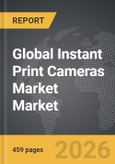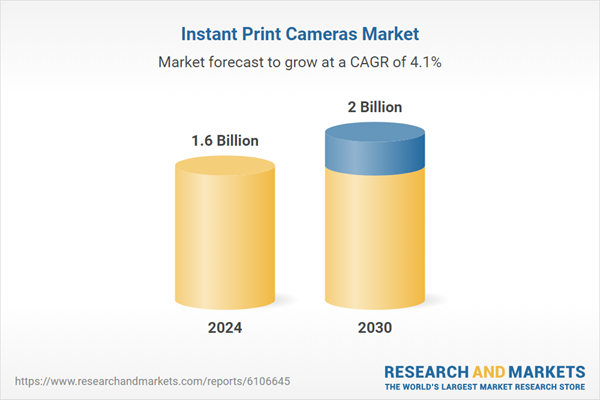Global Instant Print Cameras Market - Key Trends & Drivers Summarized
Why Are Instant Print Cameras Enjoying a Modern Revival in a Digital Age?
Instant print cameras are experiencing a robust resurgence as consumers increasingly seek tangible, nostalgic experiences in an otherwise overwhelmingly digital world. Once considered a relic of past decades, these cameras have regained popularity by offering a unique value proposition: instant gratification through physical photographs that users can hold, share, or display within seconds of capture. In an age dominated by social media and smartphone photography, the appeal of printed memories has re-emerged, especially among younger generations who crave authenticity, personalization, and retro aesthetics. Millennials and Gen Z consumers are particularly drawn to instant cameras for their novelty, simplicity, and ability to produce keepsakes that transcend digital timelines. The tactile nature of printed images gives users a break from screen-based interactions, creating a deeper emotional connection to the captured moment. Social events, weddings, and travel experiences are popular use cases where instant cameras add fun and spontaneity to memory-making. Influencers and content creators also incorporate these cameras into their branding, fueling a visual culture that blends vintage charm with contemporary relevance. The resurgence of analog-themed products in fashion, music, and design has contributed to the overall popularity of instant cameras as part of a larger cultural trend. As consumers increasingly value offline interactions and physical mementos, instant print cameras are carving a distinctive niche in the photography market, standing as a counterbalance to the ubiquity and fleeting nature of digital photos.Can Technology and Design Innovation Sustain Long-Term Interest in Instant Print Cameras?
Technological and design innovations are playing a crucial role in sustaining and expanding interest in instant print cameras by modernizing their functionality while preserving the core appeal of instant photography. Today's instant cameras are not only more compact and lightweight but also offer improved image quality through better lenses, automatic exposure settings, and integrated flash systems. Many newer models feature hybrid capabilities, combining digital sensors with traditional instant printing mechanisms, allowing users to preview, edit, or select photos before printing. This reduces waste and enhances the user experience, especially for those who want the charm of analog with the control of digital. Some models also include memory card storage, Bluetooth connectivity, and mobile apps, bridging the gap between instant prints and digital sharing. Enhanced battery life and rechargeable power sources have improved usability, making these devices more reliable for travel and event use. Manufacturers are also introducing customization features such as various film formats, decorative borders, and filter effects that appeal to creative users. Sustainable materials and eco-friendly film options are being explored to align with rising environmental consciousness. Product aesthetics remain a focus, with camera designs featuring vibrant colors, minimalist silhouettes, and retro styling that attract consumers from both tech-savvy and fashion-forward demographics. These design and tech upgrades not only address previous limitations of instant print cameras but also expand their appeal to a wider audience. By blending convenience, creativity, and vintage-inspired design with digital enhancements, technology is ensuring that instant print cameras remain relevant and desirable in a rapidly evolving imaging landscape.How Do Consumer Lifestyles and Demographics Influence Market Segmentation and Demand?
The market for instant print cameras is highly influenced by diverse consumer lifestyles and demographic preferences, resulting in varied product offerings tailored to distinct user segments. Young adults and teenagers are a dominant demographic, drawn to the playful and creative aspects of instant photography, often using it to document social events, vacations, or everyday moments in a way that feels more meaningful than digital snapshots. This group tends to favor cameras that are compact, affordable, and easy to use, often choosing models with fun colors and accessories. In contrast, hobbyist photographers and retro enthusiasts appreciate premium models that offer manual settings, classic aesthetics, and superior film quality, seeing instant photography as an art form or a nostalgic hobby. Parents and families also contribute to market growth, using instant cameras to capture childhood milestones, birthday parties, and holiday gatherings, with the prints serving as cherished mementos or additions to scrapbooks. Event planners and wedding coordinators use instant print stations as interactive elements at receptions, where guests can create instant guest books or take home souvenirs. Retailers have capitalized on this trend by creating bundled gift sets, camera-and-film packages, and seasonal promotions. In addition, educational institutions and creative workshops incorporate instant cameras as tools for visual storytelling, journaling, and art projects, tapping into their educational and expressive potential. The diversity in use cases and user motivations has led manufacturers to develop a wide range of models with varying features, price points, and aesthetics. This segmentation ensures that instant print cameras resonate across different age groups, cultures, and lifestyles, reinforcing their place as a versatile product in the modern imaging market.What Is Fueling the Rapid Growth of the Instant Print Cameras Market Worldwide?
The growth in the instant print cameras market is driven by several interconnected factors that span technological innovation, evolving consumer behavior, and cultural trends. A major driver is the global nostalgia movement, where consumers are rediscovering the charm of analog experiences in an increasingly digital world. Instant print cameras fit perfectly into this narrative, offering a blend of creativity and simplicity that appeals across age groups. Another significant factor is the rise of experiential retail and event-based marketing, where instant cameras are used to create memorable brand activations, personalized giveaways, and social media-friendly moments. The gifting market has also fueled demand, with instant cameras becoming a popular choice for birthdays, graduations, and holidays, often marketed through curated packages and themed editions. Expanding e-commerce channels have made it easier for consumers to access a wide variety of models and film options, especially in regions where brick-and-mortar photography stores have declined. Influencer marketing and user-generated content on platforms like Instagram and TikTok have amplified the visibility and desirability of instant cameras, turning them into lifestyle accessories as well as photography tools. Strategic partnerships between camera brands and fashion or entertainment companies have resulted in limited-edition releases that attract both collectors and trend followers. Additionally, improvements in production efficiency and supply chain logistics have helped keep prices accessible while maintaining profitability for manufacturers. The convergence of these trends, combined with a growing emphasis on creativity, personalization, and tangible media, is propelling the instant print camera market into a new phase of global expansion. As consumers continue to seek products that offer emotional value and analog charm, the instant print camera industry is well-positioned for long-term growth.Report Scope
The report analyzes the Instant Print Cameras market, presented in terms of market value (US$). The analysis covers the key segments and geographic regions outlined below:- Segments: Product Type (Retractable Lens Camera, Non-Retractable Lens Camera); Type (Smart Camera, Non-Smart Camera); Distribution Channel (Retail Distribution Channel, Online Distribution Channel, Non-Retail Distribution Channel); End-Use (Individual End-Use, Commercial End-Use).
- Geographic Regions/Countries: World; United States; Canada; Japan; China; Europe (France; Germany; Italy; United Kingdom; Spain; Russia; and Rest of Europe); Asia-Pacific (Australia; India; South Korea; and Rest of Asia-Pacific); Latin America (Argentina; Brazil; Mexico; and Rest of Latin America); Middle East (Iran; Israel; Saudi Arabia; United Arab Emirates; and Rest of Middle East); and Africa.
Key Insights:
- Market Growth: Understand the significant growth trajectory of the Retractable Lens Camera segment, which is expected to reach US$1.4 Billion by 2030 with a CAGR of a 4.8%. The Non-Retractable Lens Camera segment is also set to grow at 2.6% CAGR over the analysis period.
- Regional Analysis: Gain insights into the U.S. market, valued at $438.8 Million in 2024, and China, forecasted to grow at an impressive 7.6% CAGR to reach $420.1 Million by 2030. Discover growth trends in other key regions, including Japan, Canada, Germany, and the Asia-Pacific.
Why You Should Buy This Report:
- Detailed Market Analysis: Access a thorough analysis of the Global Instant Print Cameras Market, covering all major geographic regions and market segments.
- Competitive Insights: Get an overview of the competitive landscape, including the market presence of major players across different geographies.
- Future Trends and Drivers: Understand the key trends and drivers shaping the future of the Global Instant Print Cameras Market.
- Actionable Insights: Benefit from actionable insights that can help you identify new revenue opportunities and make strategic business decisions.
Key Questions Answered:
- How is the Global Instant Print Cameras Market expected to evolve by 2030?
- What are the main drivers and restraints affecting the market?
- Which market segments will grow the most over the forecast period?
- How will market shares for different regions and segments change by 2030?
- Who are the leading players in the market, and what are their prospects?
Report Features:
- Comprehensive Market Data: Independent analysis of annual sales and market forecasts in US$ Million from 2024 to 2030.
- In-Depth Regional Analysis: Detailed insights into key markets, including the U.S., China, Japan, Canada, Europe, Asia-Pacific, Latin America, Middle East, and Africa.
- Company Profiles: Coverage of players such as AssetWorks, CaseWare IDEA, CCH iFirm (Wolters Kluwer), Clio, Codex Software and more.
- Complimentary Updates: Receive free report updates for one year to keep you informed of the latest market developments.
Some of the 39 companies featured in this Instant Print Cameras market report include:
- Canon Inc.
- Casio Computer Co., Ltd.
- C&A Marketing Inc.
- China Lucky Group Corporation
- Fujifilm Holdings Corporation
- Hewlett-Packard Company (HP)
- Impossible B.V. (Polaroid Originals)
- InstantFlex (MiNT Camera)
- Kodak Alaris
- Leica Camera AG
- LG Electronics Inc.
- Lomographische AG (Lomography)
- Olympus Corporation
- Prynt Corp.
- Ricoh Company, Ltd.
- SereneLife (Sound Around Inc.)
- Sharp Corporation
- Sony Corporation
- Xiaomi Corporation
- Zink Holdings LLC
This edition integrates the latest global trade and economic shifts into comprehensive market analysis. Key updates include:
- Tariff and Trade Impact: Insights into global tariff negotiations across 180+ countries, with analysis of supply chain turbulence, sourcing disruptions, and geographic realignment. Special focus on 2025 as a pivotal year for trade tensions, including updated perspectives on the Trump-era tariffs.
- Adjusted Forecasts and Analytics: Revised global and regional market forecasts through 2030, incorporating tariff effects, economic uncertainty, and structural changes in globalization. Includes historical analysis from 2015 to 2023.
- Strategic Market Dynamics: Evaluation of revised market prospects, regional outlooks, and key economic indicators such as population and urbanization trends.
- Innovation & Technology Trends: Latest developments in product and process innovation, emerging technologies, and key industry drivers shaping the competitive landscape.
- Competitive Intelligence: Updated global market share estimates for 2025, competitive positioning of major players (Strong/Active/Niche/Trivial), and refined focus on leading global brands and core players.
- Expert Insight & Commentary: Strategic analysis from economists, trade experts, and domain specialists to contextualize market shifts and identify emerging opportunities.
Table of Contents
Companies Mentioned (Partial List)
A selection of companies mentioned in this report includes, but is not limited to:
- Canon Inc.
- Casio Computer Co., Ltd.
- C&A Marketing Inc.
- China Lucky Group Corporation
- Fujifilm Holdings Corporation
- Hewlett-Packard Company (HP)
- Impossible B.V. (Polaroid Originals)
- InstantFlex (MiNT Camera)
- Kodak Alaris
- Leica Camera AG
- LG Electronics Inc.
- Lomographische AG (Lomography)
- Olympus Corporation
- Prynt Corp.
- Ricoh Company, Ltd.
- SereneLife (Sound Around Inc.)
- Sharp Corporation
- Sony Corporation
- Xiaomi Corporation
- Zink Holdings LLC
Table Information
| Report Attribute | Details |
|---|---|
| No. of Pages | 459 |
| Published | February 2026 |
| Forecast Period | 2024 - 2030 |
| Estimated Market Value ( USD | $ 1.6 Billion |
| Forecasted Market Value ( USD | $ 2 Billion |
| Compound Annual Growth Rate | 4.1% |
| Regions Covered | Global |









